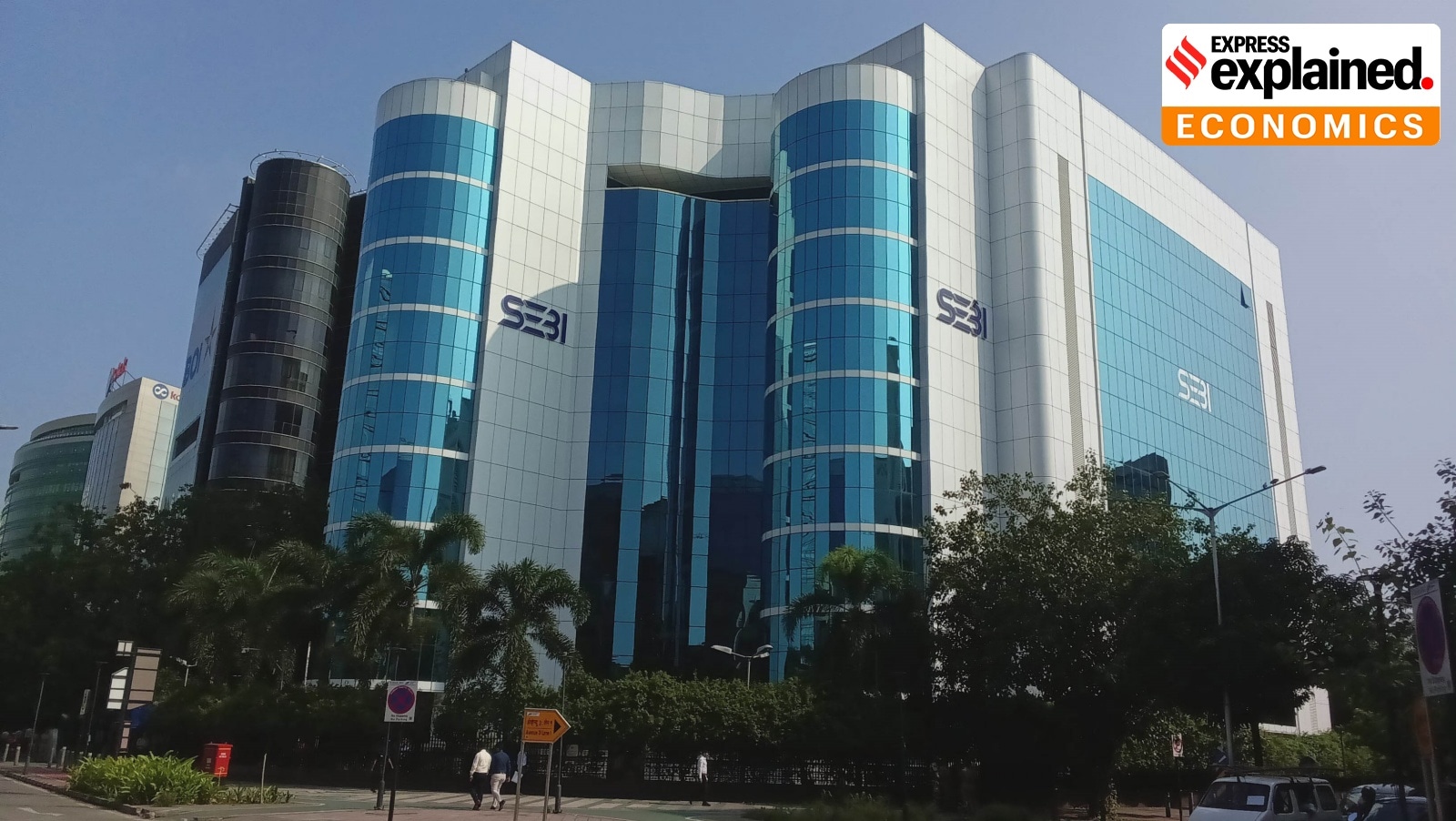Why are SME IPOs flourishing amid regulator’s concerns over misconduct?
Even as the Sebi contemplates tighter IPO norms for SMEs in the wake of a series of misconducts, the SME IPO market is flourishing with huge oversubscriptions and listing at high premium
 Sebi headquarters at the business district of Bandra Kurla Complex in Mumbai. (Express photo by Pradip Das)
Sebi headquarters at the business district of Bandra Kurla Complex in Mumbai. (Express photo by Pradip Das)Market regulator Securities and Exchange Board of India (Sebi) on Tuesday (December 3) cancelled the SME (small and medium enterprises) public issue of Trafiksol ITS Technologies, whose issue was oversubscribed 345.65 times, and asked the company to refund the money to the investors for alleged misuse of funds through a ‘shell entity’.
Even as the Sebi contemplates tighter IPO norms for SMEs in the wake of a series of misconducts, the SME IPO market is flourishing with huge oversubscriptions and listing at high premium. While many genuine SMEs have successfully raised money through IPOs, Sebi has raised concerns over the quality of some of the IPOs.
Who are the big movers?
As many as 29 out of 61 SME IPOs that came to the market witnessed oversubscription of over 100 times since September this year. Rajputana Biodiesel which closed its IPO on November 28 was oversubscribed 718 times, Apex Ecotech 457 times, Lakshya Powertech by 573 times, Thinking Hats by 322 times, Sodhani Academy of Fintech Enablers Ltd by 438 times and Travels and Rentals by 608 times.
Several SME IPOs have gained ground by over 100 per cent after listing. Rajesh Power which was listed on December 2 has gained 109 per cent, C2C advanced by 99.49 per cent (listed on December 3), Neelam Linens by 159 per cent, Danish Power by 168 per cent, Sahasra Electronics by 136 per cent.
What are the concerns?
In a consultation paper, Sebi has observed that diversion of issue proceeds to related parties, connected parties, shell companies and inflation of revenue by circular transactions through related parties, connected parties and shell companies. In some SME companies, the entity diverted money raised through the IPO and subsequent Rights Issue to shell companies controlled by the promoters.
In another instance, a company booked fraudulent sales and purchases through circular transactions amongst related parties and connected parties. By doing so, such companies try to create a positive sentiment to induce investors into purchasing their securities. SEBI has passed orders against such entities in the recent past.
SME listed entities are typically promoter driven or family business companies with high concentration of shareholding among a few promoters, promoter group persons or entities. There is also limited presence of private equity investors and sophisticated investors, who act as a check on the promoter’s influence, in such companies.
In the case of Trafiksol, Sebi concluded that the third-party vendor (TPV), which was given a Rs 17.70 crore software contract, is a ‘shell entity’ that had questionable financials and failed to file its annual financial statements. The TPV’s office was found locked during a site inspection, and its financial statements for FY22 to FY24, submitted in response to allegations, were obtained under questionable circumstances.
Sebi said that one out of two SME listed entities have undertaken related party transactions (RPTs) of more than Rs 10 crore and one out of five SME listed entities have undertaken RPTs of more than Rs 50 crore.
What’s fuelling SME IPOs?
With an increase in the number of SME issues, investor participation has also increased in such offerings. The applicant to allotted investor ratio increased from 4 times in FY 22 to 46 times in FY23 and 245 times in FY24, according to Sebi data.
“The recent surge in SME stocks and strong listings gains in some of the companies are largely driven by three key factors — high market liquidity has fuelled exaggerated price movements in smaller, less liquid SME stocks as investors chase high returns and disregard the underlying risk. The fear of missing out on quick gains has spurred continued investment in SME IPOs. Increased retail investor involvement has amplified interest in the SME segment,” said Vaibhav Porwal, Co-founder, Dezerv.
What SME IPO data shows?
Since operationalisation of the SME Exchange on the NSE and the BSE, a total of 565 exclusive companies have listed on the NSE and 524 exclusive companies have listed on the BSE platform of which 322 SME companies have migrated to Main Board (140 from the NSE SME Exchange and 182 from the BSE SME Exchange as on October 15, 2024.
As on October 15, 2024, a total of 417 companies are listed on the NSE SME Exchange having market capitalisation of Rs 1.31 lakh crore and a total of 328 companies are listed on the BSE SME Exchange having market capitalization of Rs 68,500 crore. Thus, together there are 745 SME companies with a market capitalisation of around Rs 2 lakh crore.
Further, on the NSE out of 417 SME listed companies as on October 15, 2024, 12 companies are suspended and in 15 companies no trade is executed in one month – September 15, 2024 to October 15, 2024 (Includes 11 suspended and 4 others). On BSE out of 328 companies as on October 15, 2024, 28 companies were suspended and in 35 companies no trade was executed in the last one month — September 15, 2024 to October 15, 2024 — Including 24 suspended and 11 others.
How much money was raised by SMEs in FY 23-24?
After the establishment of SME platforms, FY 2023-24 witnessed the highest number of SME public issues and highest fundraising with 196 IPOs tapping the market to mobilise more than Rs 6,000 crore. Also, in current FY 2024-25, already till October 15, 2024, more than Rs 5,700 crore has been raised through 159 SME IPOs.
What has Sebi planned to check misconduct?
Sebi has now proposed doubling the minimum application value to Rs 2 lakh, restricting the offer for sale (OFS) limit to 20 per cent of the issue size, mandating the appointment of monitoring agencies to ensure that the money raised through an IPO was used appropriately and several other measures.
Sebi, in the consultation paper, said that it is considering an increase in the minimum number of allottees from current 50 to 200 to declare an SME IPO successful. “It is proposed that lock-in on minimum promoter contribution (MPC) in SME IPO shall be increased to 5 years. Additionally, lock-in on promoters’ holdings held in excess of MPC should be released in a phased manner,” it said.
The regulator said there is a need for greater scrutiny of RPTs which may be misused as instruments for fund diversion. Considering increased activity in the SME segment, instances of misconduct, risks relating to siphoning of funds and promoter / investors exiting the company after listing, it is felt that to protect the interest of the investors and market as a whole, there is a need to review SME IPO framework, Sebi said.
- 01
- 02
- 03
- 04
- 05






































